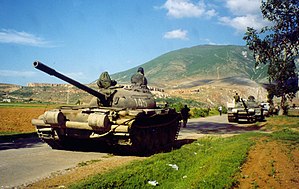This is an old revision of this page, as edited by 86.80.229.46 (talk) at 22:39, 7 April 2013 (Clear vandalism, Undid revision 549201869 by 109.106.246.217 (talk)). The present address (URL) is a permanent link to this revision, which may differ significantly from the current revision.
Revision as of 22:39, 7 April 2013 by 86.80.229.46 (talk) (Clear vandalism, Undid revision 549201869 by 109.106.246.217 (talk))(diff) ← Previous revision | Latest revision (diff) | Newer revision → (diff)| Albanian-Yugoslav border incident | |||||||
|---|---|---|---|---|---|---|---|
| Part of the Kosovo War | |||||||
 Albanian Type 59 Tanks at the border | |||||||
| |||||||
| Belligerents | |||||||
|
|
| ||||||
| Commanders and leaders | |||||||
| Unknown | File:Emblem of Albanian MoD.png Kudusi Lama | ||||||
| Strength | |||||||
| 50 soldiers of 63rd Paratroop Battalion | Unknown | ||||||
| Casualties and losses | |||||||
|
| 3 Albanian civilians killed and 16 civilians wounded | ||||||
An Albania-Yugoslav border incident took place in April 1999 when the FR Yugoslav Army shelled several Albanian border towns around Krumë, Tropojë. In these villages, refugees and insurgents of the Kosovo Liberation Army (KLA) were being housed after fleeing the war in Kosovo by crossing into Albania. On 13 April 1999, Yugoslav infantry entered Albanian territory to close off an area that was used by the KLA to stage attacks against Yugoslav targets.
Background
The Kosovo War was a conflict between the government of the Federal Republic of Yugoslavia (FRY) and the Kosovo Liberation Army (KLA). The war had expanded after the attack on Prekaz which saw thousands of ethnic Albanians joining the KLA ranks. More than 500,000 Albanian refugees fled to Albania to escape Yugoslav Army reprisals. Meanwhile, the KLA began to recruit in the refugee camps. There had been fighting in along the border between the FRY and Albania between the KLA and Yugoslav forces where KLA troops had infiltrated into Kosovo. The forthcoming incursion by the FRY could have been in response to KLA actions in the area, according to Albanian police.

Relations between the FRY and Albania had been strained as 300,000 ethnic Albanians had fled into Albania itself. The Yugoslavs had been angered over Albania's support of NATO airstrikes and its sheltering of KLA militants. The Organization for Security and Co-operation in Europe (OSCE) had reported previous Yugoslav Army incursions into Albanian territory. The border was lightly defended by the Albanian Army which was ordered not to fire back after a Yugoslav Army attack. A KLA commander had reported that rebel forces had crossing over into Kosovo near Tropojë, a KLA stronghold, in the days before the attack.
Incident
On 13 April 1999, Yugoslav infantry entered Albanian territory to close off an area that was used by the KLA to stage attacks against Yugoslav targets. FR Yugoslav forces maneuvered into the village of Kamenica, searching for KLA insurgents and torched several houses in the process. They advanced 8 miles into Albanian territory before being halted by local militiamen and around thirty KLA insurgents. The undermanned Yugoslav units were then forced back by their numerically superior opponents. After two hours of fighting, the Albanian Army was deployed and started shelling the Yugoslav positions with howitzers, Type 59 tanks and MLRs. Within 10 minutes, the Yugoslav paratroopers retreated and crossed the border into Yugoslavia. The Albanian Army then continued shelling the Yugoslav units while they were retreating back across the border.
From their positions on the Yugoslavian side of the border, the soldiers of the Yugoslav Army fired at least 10 shells on the town of Krumë, where hundreds of ethnic Albanian refugees and KLA insurgents were seeking refuge. The shelling happened just before midnight, prompting a massive exodus to the town of Kukes, some 10 miles from the Kosovo-Albanian border.
Albania claimed several dead Yugoslav soldiers, and Albanian Prime Minister Pandeli Majko said that several bodies where pulled out by the Yugoslavs, in order to prevent a further escalation of international reactions.
Reactions
According to international war rules, Albania could have declared war on Yugoslavia when paratroopers crossed into Albanian territory. The OSCE said it was in retaliation for KLA attacks in Kosovo. Despite the OSCE also reporting that Yugoslav paratroopers crossed the border, the Ministry of Foreign Affairs of Yugoslavia denied any attack had occurred. The ministry declared that Yugoslavian airborne troops did not enter Albania.
References
- ^ Majko, Pandeli (26 Mars 2013). "TV Klan interview given of ex-PM Pandeli Majko (declaration on 52:23)". Opinion.
{{cite web}}: Check date values in:|date=(help) - ^ Daly, Emma (14 April 1999). "War In The Balkans: Serbs enter Albania and burn village". The Independent.
- Katamaj, Halil (2002), Kudusi Lama, gjenerali i luftes : Divizioni i Kukësit gjatë Luftës së Kosovës, Tiranë: Mokra, ISBN 99927-781-0-5
- ^ Daniszewski, John (14 April 1999). "Yugoslav Troops Said to Cross Into Albania". Los Angeles Times.
- ^ Fisher, Ian (7 June 1999). "Surge of Fighting on Kosovo-Albania [[Border|Border crossings of Albania]] / Refugees on the run again for safety". New York Times.
{{cite web}}: URL–wikilink conflict (help) - "Albania reports incursion by Yugoslav forces". BBC. 14 April 1999. Retrieved 27 October 2012.
- "Albania says Serb forces cross border, occupy village". CNN. 13 April 1999.